The benefits and harms of pomegranate for the health of women, men and children
Many people have heard that pomegranate is useful, but not everyone knows what exactly it is. It has a unique composition, a powerful concentration of vitamins and microelements, while being low in calories. The fruit is used completely - from the peel and partitions to seeds. Berries and juice have found application in nutrition, cosmetology, and folk medicine. Read on to find out how many calories there are in a pomegranate, its health benefits and harms.
Chemical composition and properties of pomegranate
The beneficial substances contained in the fruits have a positive effect on all human systems and organs. Thanks to its composition pomegranate Recommended for both children and adults. It gives strength and energy to elderly and weakened people.
Content of vitamins and minerals
The presence of anthocyanins in the composition caused the ruby color of the grains. Phenolic compounds and essential amino acids for humans give a unique tart taste and aroma.
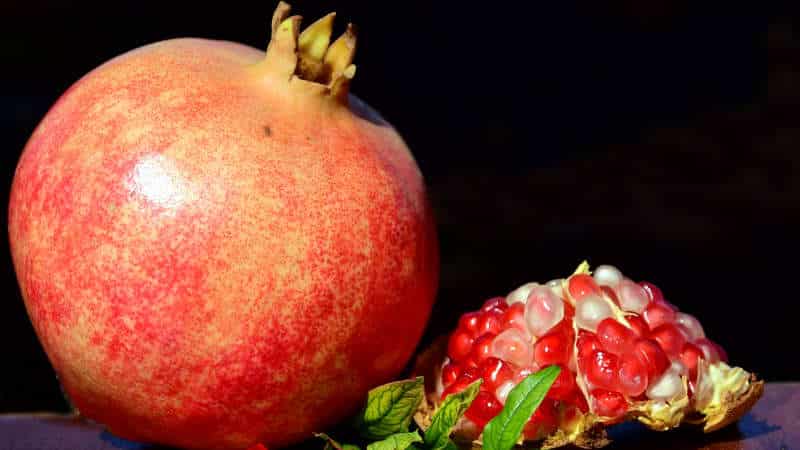
Content of minerals and vitamins per 100 g:
- 4 mg of ascorbic acid (vitamin C) – to protect the immune system;
- 8.7 mg of B vitamins – strengthens the nervous system;
- 0.4 mg of tocopherol (E) – prolongs youth;
- 0.5 mg of vitamin PP – maintains the tone of blood vessels and the heart;
- 150 mg of potassium and 2 mg of sodium – regulate intracellular pressure;
- 10 mg of calcium and 8 mg of phosphorus – for the formation and strengthening of the skeletal system;
- 2 mg of magnesium – participates in metabolism, for example, glucose, protein and nucleic acid synthesis;
- 1 mg of iron – ensures the full production of red blood cells, thus helping to saturate organs and tissues with oxygen.
There are so many vitamins and minerals in grains that 100 g (3/4 of the fruit) provides half the daily requirement.
Calorie content and BZHU
The almost complete absence of fat in pomegranate makes it indispensable in dietary nutrition. Fiber benefits the digestive system, and most carbohydrates supply essential substances, that is, substances not produced by the body.
The composition of the fruit per 100 g:
- proteins – 0.7 g;
- fat – 0.6 g;
- carbohydrates – 14.5 g;
- fiber – 0.9 g;
- water – 81 g.
Average calorie content – 55 kcal. Due to its negligible fat content and the presence of substances that activate metabolic processes, pomegranate promotes fat burning.
Glycemic index
Pomegranate is one of the safest foods for those who control body weight. Its GI is 35 units. However, people who are overweight and have uncontrollable food cravings should not consume it - it increases appetite.
Benefits and harm to the body

Since ancient times, pomegranate has been considered a symbol of fertility in various cultures. It was used to treat many diseases.
Modern medicine recommends consuming fruits for the following diseases and conditions:
- weakened immune system;
- inflammatory processes;
- hypertension;
- increased nervous excitability;
- parasites;
- anemia;
- increased intracranial pressure;
- angina;
- stomatitis;
- after a course of chemotherapy.
Pomegranate helps remove toxins from the body, increases overall tone, normalizes the gastrointestinal tract, promotes wound healing, and regulates metabolism.
Important! Pomegranate protects blood vessels from the formation of atherosclerotic plaques, thereby reducing the risk of heart attacks and strokes.
Contraindications
Despite the undoubted benefits, eating the fruit is not beneficial for everyone.
Contraindications:
- gastrointestinal diseases in the acute stage (pancreatitis, stomach ulcers, gastritis with high acidity);
- constipation;
- allergic reactions;
- hypotension;
- diabetes.
Excessive consumption of exotic fruit can cause nausea, heartburn, increased sensitivity of teeth, and problems with stool.
What are the benefits of pomegranate depending on gender/age?
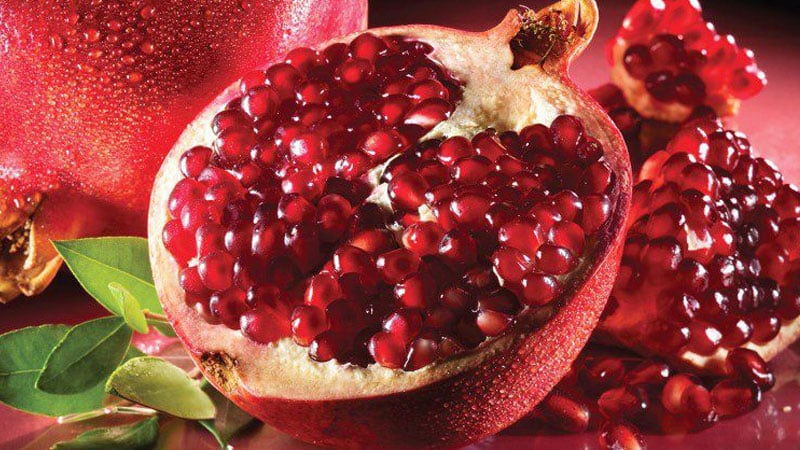
The specific characteristics of female and male organisms determine different values when consuming “Carthaginian berries”.
For women
Pomegranate normalizes the menstrual cycle, reducing the intensity of discharge and reducing pain. During menopause, it relieves irritability and increased sweating.
During pregnancy it is indicated for low hemoglobin. The vitamin E, calcium, magnesium, and potassium it contains contribute to the proper intrauterine development of the fetus. Amino acids normalize hormonal levels.
Pomegranate contains antioxidants that bind free radicals. Thanks to this, the skin receives protection from aggressive factors. The fruits stimulate the production of collagen, which maintains elasticity and youthfulness of the skin.
Important! Pomegranate contains substances that block excess estrogen production, which causes breast cancer.
Men
For the stronger sex, pomegranate helps with mild to moderate impotence and doubles the level of the male hormone testosterone. Regular consumption reduces the risk of prostate cancer.
Children
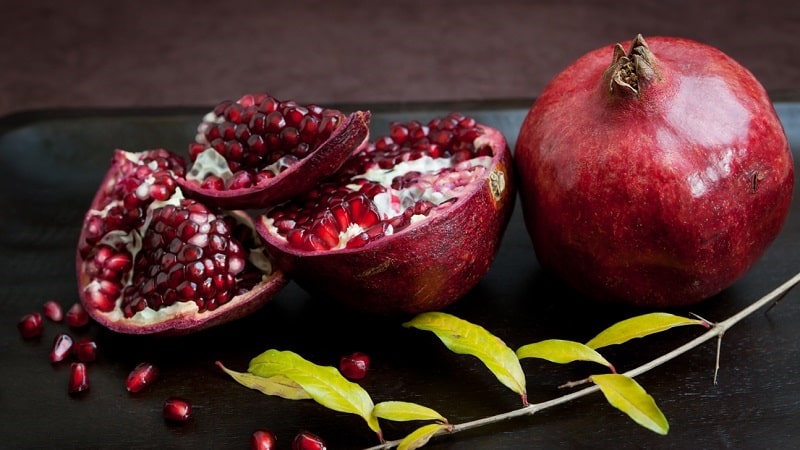
In the absence of allergic manifestations, from the age of 10 months, infants are given diluted pomegranate juice. For children, the fruit is useful for strengthening immunity and memory, relieving stress, and increasing resistance to mental stress.
In what form and quantity to eat to get maximum benefit?
Pomegranate can be eaten almost entirely: The grains are tasty and healthy in themselves; the membranes and skin are an excellent means of increasing efficiency and immunity, and eliminating digestive problems.
A healthy person can safely eat 2-3 ripe fruits a day. Pregnant women only need one pomegranate.
If you have diabetes and there are no other contraindications, one fruit will not have a negative effect, but will bring tangible benefits.
Important! Pomegranate strengthens hair follicles, which stops hair loss.
Pomegranate seeds
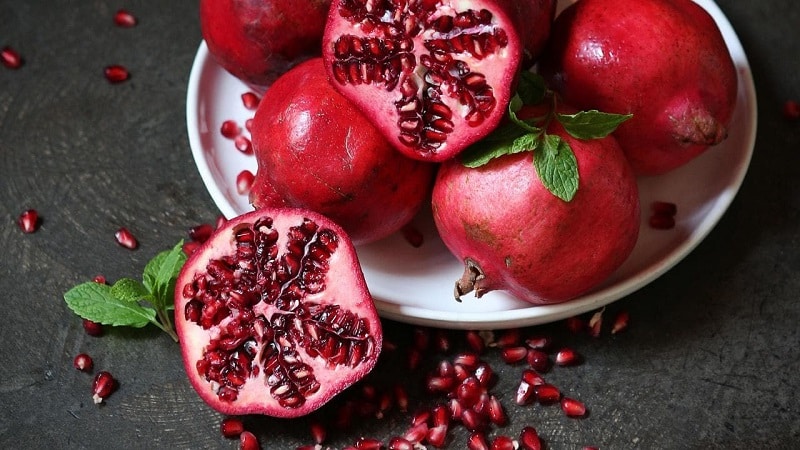
Dried and crushed pomegranate seeds effectively relieve headaches and normalize blood pressure. Their regular use normalizes hormonal levels. Powder mixed with honey treats toothache, and diluted in pineapple juice expels worms.
A scrub is prepared from ground seeds to cleanse the skin of the face.
Pomegranate juice
It should not be bought ready-made. Only freshly squeezed juice will benefit the body:
- strengthens the immune system;
- removes excess fluid and relieves swelling;
- increases hemoglobin levels;
- normalizes appetite and stool;
- increases performance;
- maintains youthful and healthy skin;
- restores strength and reduces the risk of developing cancer.
Pomegranate juice is effective as a diuretic without causing seizures.It does not flush potassium from the body, making it preferable to medications.
Use in cooking
Fresh pomegranate seeds are included in salads and desserts. When stewing, baking or frying meat, they are added to give a piquant sweet and sour taste. The famous “narsharab” sauce is also prepared from pomegranate, indispensable for lamb, red fish, and kebabs.
Juices, jams, and wine are also prepared from the fruits.
In folk medicine
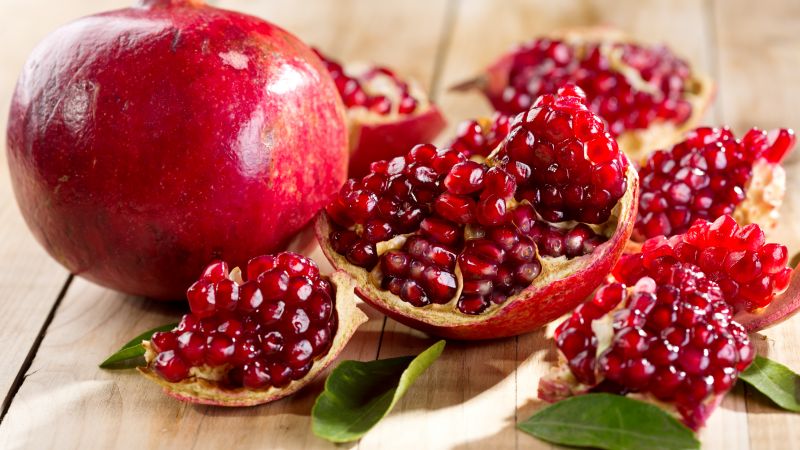
Pomegranate septum and skin are mainly used as a home remedy. They are dried, then infusions are prepared and decoctions.
Used in the treatment of inflammatory diseases - sore throat, influenza, ARVI. To strengthen the immune system and eliminate diarrhea, teas with the addition of pomegranate partitions are effective. For skin diseases (rash, eczema, dermatitis), apply compresses and lotions.
How to select and store pomegranate
When buying fruit, pay attention to the absence of external damage, signs of rot and mold. The peel should be firm, the grains should be slightly covered. Color – from dark red to light brown.
A soft fruit indicates improper storage or that the pomegranate is overripe. Too light skin means that the fruit is unripe.
Store pomegranate in a cool, dark place at a temperature of 0 to 10°C. Such conditions are ideally created in the lower compartment of the refrigerator, intended for vegetables and fruits. Long-term storage is detrimental to the fetus - it is better use no later than 5-7 days after purchase.
This is interesting:
A step-by-step guide to propagating pomegranate from cuttings at home.
Conclusion
Pomegranate is not only tasty, but also very beneficial for the human body.Thanks to him, women gain slimness and maintain youth. Representatives of the stronger sex who consume pomegranate regularly can boast of masculine strength and high testosterone levels. Children will forget about fatigue and frequent colds. Pomegranate is also indispensable during pregnancy as a complete source of health for the unborn child.